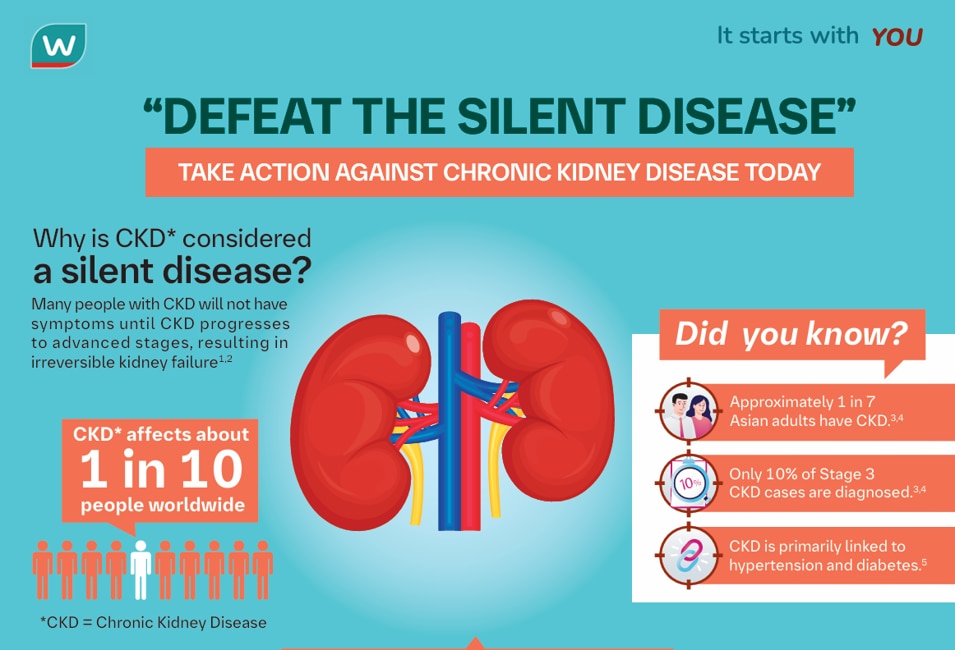
Once a person is diagnosed with any of the cardio-renal and metabolic (CRM) disorders like hypertension, heart failure (HF), chronic kidney disease (CKD), or type 2 diabetes mellitus (DM), a lifelong journey of managing chronic conditions begins.
Managing these conditions becomes a personal challenge for many Filipinos. It affects them and their families—emotionally, socially, and financially—and prevents them from living their best life.
Staying on track with doctor’s prescribed medications is not just a personal responsibility— it’s an act of love for oneself and loved ones.
Achieving a longer and better quality of life, despite having a CRM disorder, starts with the most critical step of medication compliance.
What are cardio-renal and metabolic (CRM) disorders?
CRM disorders refer to interrelated health issues involving the heart (cardio), kidneys (renal), and metabolism. These include:
- Hypertension, or high blood pressure, is when the force of your blood pushing against the walls of your blood vessels is too high. If left untreated, hypertension can lead to serious health problems such as heart attack and stroke. 1
- Globally, about 1.28 billion adults aged 30–79 years have hypertension. 2
- Hypertension is a major cause of premature death worldwide. 2
- Among Filipinos, hypertension is the most common risk factor associated with cardiovascular diseases. 3
- 69.1% of older Filipinos have hypertension. 4
- Heart failure happens when the heart cannot pump blood effectively. It can develop suddenly, such as after a heart attack. It can also develop gradually as a result of other illnesses that weaken the heart, such as hypertension. Progression of HF can lead to shortness of breath, fluid buildup in the body, or sudden cardiac arrest. 5
- The prevalence of HF more than doubled globally, from 25.43 million cases in 1990 to 55.50 million in 2021. 6
- Mortality from heart failure in Filipino patients at 1 year is at 16.1%. 7
- Chronic kidney disease (CKD) is when the kidneys become damaged and cannot filter blood as well as they should. It is often caused by other conditions such as hypertension or diabetes. 8,9
- CKD affects >10% of the general population worldwide, amounting to >800 million individuals. 10
- CKD as a cause of death globally has increased by approximately 41.5% from 1990 to 2017. 10
- Prevalence of CKD in the Philippines is 35.94%, which is much higher than estimated global rates. 11
- Roughly 2.3 million Filipinos have chronic kidney disease. 12
- Chronic kidney disease is the 7th leading cause of death in the Philippines. 13
- Type 2 diabetes mellitus is a chronic metabolic condition that affects how the body processes sugar (glucose). It often leads to complications in the heart, kidneys, and other organs. 14
- The number of people with diabetes around the world rose from 200 million in 1990 to 830 million in 2022. 15
- Globally, diabetes was the direct cause of 1.6 million deaths in 2021, and 47% of all deaths due to diabetes occurred before the age of 70 years. 16
- About 4.3 million Filipinos were diagnosed with diabetes, while 2.8 million remained undiagnosed in 2021. 17
Why does complying with prescribed medications matter?

Non-compliance with medications is a widespread problem. Worldwide, only about 50% of patients with chronic diseases adhere to their prescribed treatment plans, and adherence rates in developing countries like the Philippines are even lower. 18 Here’s why compliance is crucial:
- Health benefits
- Prevents disease progression: Taking medications properly slows down complications like kidney failure, heart attacks, or strokes. For example:
- In type 2 diabetes, good blood sugar control reduces risks of kidney damage by up to 40%. 19
- Controlling blood pressure below 130/80 mmHg significantly lowers cardiovascular risks in CKD patients. 19
- Prevents disease progression: Taking medications properly slows down complications like kidney failure, heart attacks, or strokes. For example:
- Improves quality of life: Consistently following the treatment plan reduces symptoms related to the disease, allowing individuals to lead more active lives. Medications such as beta blockers and diuretics reduce the symptoms of heart failure and help prevent fluid retention, respectively. 20
- Reduces hospitalizations: Studies show that the risk of hospitalization was more than double in patients with chronic diseases who were non-adherent to prescribed therapies compared with the general population. 21
- Long-term positive effects
- Compliance with medication and lifestyle recommendations has been shown to decrease cardiovascular events and mortality in diabetes patients with advanced atherosclerosis. 22
- Improves independence, boosts well-being, and enhances family relations with less emotional stress from health crises. 23,24
- Less financial strain from healthcare expenses such as hospital stays or medical emergencies.
How do you comply with medications?
Here are practical ways to improve medication compliance and ensure that you are able to take your medications as advised by your doctors regularly:
- Set reminders: Use alarms to remember when to take your medicine.
- Build a routine: Pair taking medication with your daily habits like eating breakfast or the time of your favorite TV show.
- Involve family members: Let your loved ones help monitor your medication schedule.
- Talk to your doctor regarding your medical condition and symptoms for proper advice on medications.
Medication compliance is more than just taking tablets or pills. It’s about valuing yourself and your health for the love of your family. By religiously complying with your prescribed medicines, you can prevent complications, live a better quality of life, and enjoy more time with your loved ones.
References:
- American Heart Association. What is High Blood Pressure? Heart Org website, Available from https://www.heart.org/en/ health-topics/high-blood-pressure/the-facts-about-high-blood-pressure
- World Health Organization. Hypertension. WHO int website, Available from https://www.who.int/news-room/fact-sheets/ detail/hypertension
- Sison, Jorge A. An Overview of the PRESYON 4 Trial and Its Impact on Practice. Journal of Asian Pacific Society of Cardiology 2023;2:e24. Available from https://doi.org/10.15420/japsc.2022.16
- Abalos JB, Saito Y, Ramos MA Jr, Cruz GT. Prevalence, Awareness, Treatment, and Control of Hypertension Among Older Adults in the Philippines. J Gerontol A Biol Sci Med Sci. 2024 Feb 1;79(2):glad155. doi: 10.1093/gerona/glad155. PMID: 37379565. Available from https://pubmed.ncbi.nlm.nih.gov/37379565/
- National Heart, Lung, and Blood Institute (NHLBI). What is Heart failure? NHLBI website. Available from https:// www.nhlbi.nih.gov/health/heart-failure Accessed 15 April 2025
- Ran J, Zhou P, Wang J, Zhao X, Huang Y, Zhou Q, Zhai M, Zhang Y. Global, Regional, and National Burden of Heart Failure and Its Underlying Causes, 1990-2021: Results from the Global Burden of Disease Study 2021. Biomark Res. 2025 Jan 23;13(1):16. doi: 10.1186/s40364-025-00728-8. PMID: 39849627; PMCID: PMC11755835.
- Feng, J. et al. Epidemiology and Burden of Heart Failure in Asia. JACC Asia. 2024 Mar 19;4(4):249-264. Available from https://pmc.ncbi.nlm.nih.gov/articles/PMC11035951/
- Chronic Kidney Disease. Chronic Kidney Disease Basics. CDC’s National Center for Chronic Disease Prevention and Health Promotion (NCCDPHP) website, Available from https://www.cdc.gov/kidney-disease/about/index.html
- NHS (National Health Service) United Kingdom. Overview: Chronic Kidney Disease. NHS website for England, Available from https://www.nhs.uk/conditions/kidney-disease/#:~:text=Causes%20of%20CKD,anti- inflammatory%20drugs%20(NSAIDs)
- Kovesdy CP. Epidemiology of Chronic Kidney Disease: An Update 2022. Kidney Int Suppl (2011). 2022 Apr;12(1):7-11. doi: 10.1016/j.kisu.2021.11.003. Epub 2022 Mar 18. PMID: 35529086; PMCID: PMC9073222., Available from https:// pmc.ncbi.nlm.nih.gov/articles/PMC9073222/
- Suriyong P, Ruengorn C, Shayakul C, Anantachoti P, Kanjanarat P. Prevalence of Chronic Kidney Disease Stages 3-5 in Low- and Middle-income Countries in Asia: A Systematic Review and Meta-analysis. PLoS One. 2022 Feb 25;17(2):e0264393. doi: 10.1371/journal.pone.0264393. PMID: 35213610; PMCID: PMC8880400., Available from https:// pubmed.ncbi.nlm.nih.gov/35213610/
- Philippine Society of Nephrology (PSN). World Kidney Day 2024 Tackles Capacity Builiding and Annovation for Medical Professionals. PSN website, Available from https://psn.org.ph/wp-content/uploads/2024/01/WKD-CAPACITY-BUILDING- OF-MEDICAL-PROFESSIONALS.pdf
- National Kidney & Transplant Institute (NKTI). Kidney Health Plus. NKTI website, Available from https://nkti.gov.ph/ index.php/patients-and-visitors/kidney-health-plus
- Goyal R, Singhal M, Jialal I. Type 2 Diabetes. [Updated 2023 Jun 23]. In: StatPearls [Internet]. Treasure Island (FL): StatPearls Publishing; 2025 Jan-. Available from https://www.ncbi.nlm.nih.gov/books/NBK513253/
- World Health Organization. Diabetes. WHO int website, Available from https://www.who.int/news-room/fact-sheets/ detail/diabetes
- Cando, Leslie Faye T., Quebral, Elgin Paul B., Ong, Erika P., Catral, Charlene Divine M., Relador, Ruth Joy L., Velasco, Adrian Jonathan D., Alcazar, Renne Margaret U., Reyes, Nico Alexander L., Pilotin, Er Joshua B., Ornos, Eric David B., Paz-Pacheco, Elizabeth T., Tantengco, Ourlad Alzeus G. Current Status of Diabetes Mellitus Care and Management in the Philippines, Diabetes & Metabolic Syndrome: Clinical Research & Reviews. Volume 18, Issue 2, 2024, 102951, ISSN 1871-4021, https://doi.org/10.1016/j.dsx.2024.102951. Available from https://www.sciencedirect.com/science/article/pii/ S1871402124000122
- World Health Organization. Failure To Take Prescribed Medicine for Chronic Diseases Is a Massive, World-Wide Problem. WHO int website, Available from https://www.who.int/news/item/01-07-2003-failure-to-take-prescribed-medicine-for- chronic-diseases-is-a-massive-world-wide-problem
- Steigerwalt, Susan. Management of Hypertension in Diabetic Patients With Chronic Kidney Disease. Diabetes Spectr 1 January 2008; 21 (1): 30–36. Available from https://doi.org/10.2337/diaspect.21.1.30
- Mayo Clinic. Heart Failure. Mayo Clinic website. Available from https://www.mayoclinic.org/diseases-conditions/heart- failure/diagnosis-treatment/drc-20373148#:~:text=Beta%20blockers.,may%20help%20you%20live%20longer.
- Jimmy B, Jose J. Patient Medication Adherence: Measures in Daily Practice. Oman Med J. 2011 May;26(3):155-9. doi: 10.5001/omj.2011.38. PMID: 22043406; PMCID: PMC3191684. Available from https://pmc.ncbi.nlm.nih.gov/articles/ PMC3191684/
- Shalaeva, E. et al. Impact of Persistent Medication Adherence and Compliance with Lifestyle Recommendations on Major Cardiovascular Events and One-Year Mortality in Patients with Type 2 Diabetes and Advanced Stages of Atherosclerosis: Results from a Prospective Cohort Study. Global Heart. 2023; 18(1):61 Available from https://globalheartjournal.com/ articles/10.5334/gh.1273
- Shruthi R, Jyothi R, Pundarikaksha HP, Nagesh GN, Tushar TJ. A Study of Medication Compliance in Geriatric Patients with Chronic Illnesses at a Tertiary Care Hospital. J Clin Diagn Res. 2016 Dec;10(12):FC40-FC43. doi: 10.7860/JCDR/ 2016/21908.9088. Epub 2016 Dec 1. PMID: 28208878; PMCID: PMC5296451. Available from: https:// pmc.ncbi.nlm.nih.gov/articles/PMC5296451/
- Ayodapo, Abayomi O.; Monsudi, Kehinde Fasasi1; Omosanya, Olusegun Emmanuel2; Elegbede, Olayide Toyin2. Family Functioning and Adherence to Medication: A Study of Hypertensive in a Tertiary Hospital, South Western Nigeria. CHRISMED Journal of Health and Research 5(3):p 197-202, Jul–Sep 2018. | DOI: 10.4103/cjhr.cjhr_28_18. Available from: https://journals.lww.com/chri/fulltext/2018/05030/family_functioning_and_adherence_to_medication a.7.aspx
Document No: NP-PH-100304 | Production Date: August 2025







